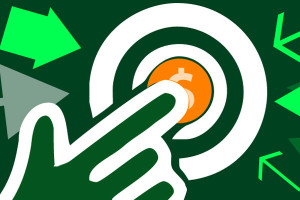The web has a slightly awkward relationship with audio. If you’re (un)lucky enough to remember the web in the late 1990’s, every other website played a damn awful midi track when the page loaded. It was shocking — especially on business PCs with crap sound cards.
Website sound was eventually killed off when:
- Internet Explorer’s monopoly ended. Other browsers didn’t always support .WAV or .MID files so Flash became the most reliable alternative — and that posed its own set of problems.
- Developers realized that sound didn’t necessarily improve their sites. The effects were trashed along with frames, marquees, blink tags, splash pages and stupid animated “page under construction” GIFs.
Today, developers rarely consider sound unless they’re creating a music or gaming website. But we’re all using cloud-based applications and sound has long been a usability feature on the desktop. Would users appreciate a quick ‘bong’ when a calendar event occurs, a ‘chirp’ when a new tweet arrives, or a ‘siren’ when Internet connectivity drops at a critical point when finishing your important spreadsheet in Google Docs?
I think sound will make a major comeback on the web — possibly this year. However, for it to happen:
- There needs to be widespread adoption of the HTML5 <
audio> tag. Few developers will consider application sound effects unless they’re easy to implement and reliable in most browsers — including Internet Explorer. - Sound needs to be unobtrusive and aid usability. Developers should use it sparingly: the odd email ‘tah-da’ alert is fine, but let’s not return to the days of page-load concertos or a ‘clunk’ on every click.
- Web application developers should offer a sound on/off option — possibly with “off” being the default.
- A sound must play the instant an event occurs. Where necessary, the application should pre-cache effects so they can be played on demand. Remy Sharp has investigated this issue: see Audio Sprites — a technique for loading multiple effects in a single audio file.
- Vendors should implement intelligent sound controls within browsers. Volume controls or a “disable sound” option would be a good start. It could go further, e.g. inactive tabs could play muffled or lower volume effects based on how recently the page was viewed.
I admit I’m not the best person to predict the future of sound on the web. I switch off all desktop and application effects because they quickly become irritating when you’re using a PC for 10 hours a day. But, in my experience, most users seem to like sound effects (or don’t know how to disable them!)
Web application effects may even be more useful and less intrusive than desktop applications. Unlike my email client, IDE or Photoshop, I rarely keep a web app open all day.
Do you think sound will make a comeback on the web? Do you want it? Will it aid usability? Will it be abused? Please leave your comments or cast your vote on the SitePoint poll.
Craig is a freelance UK web consultant who built his first page for IE2.0 in 1995. Since that time he's been advocating standards, accessibility, and best-practice HTML5 techniques. He's created enterprise specifications, websites and online applications for companies and organisations including the UK Parliament, the European Parliament, the Department of Energy & Climate Change, Microsoft, and more. He's written more than 1,000 articles for SitePoint and you can find him @craigbuckler.


